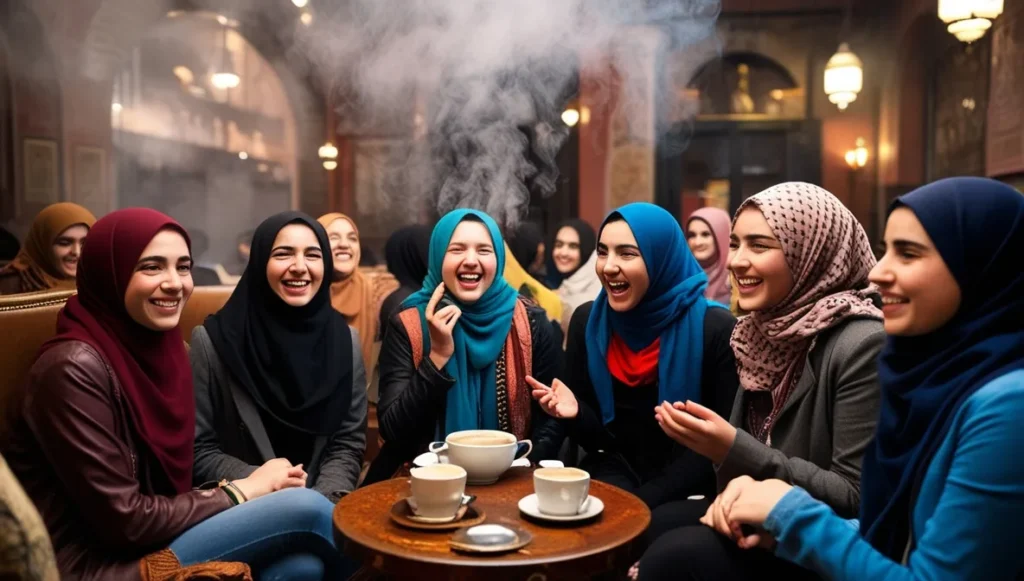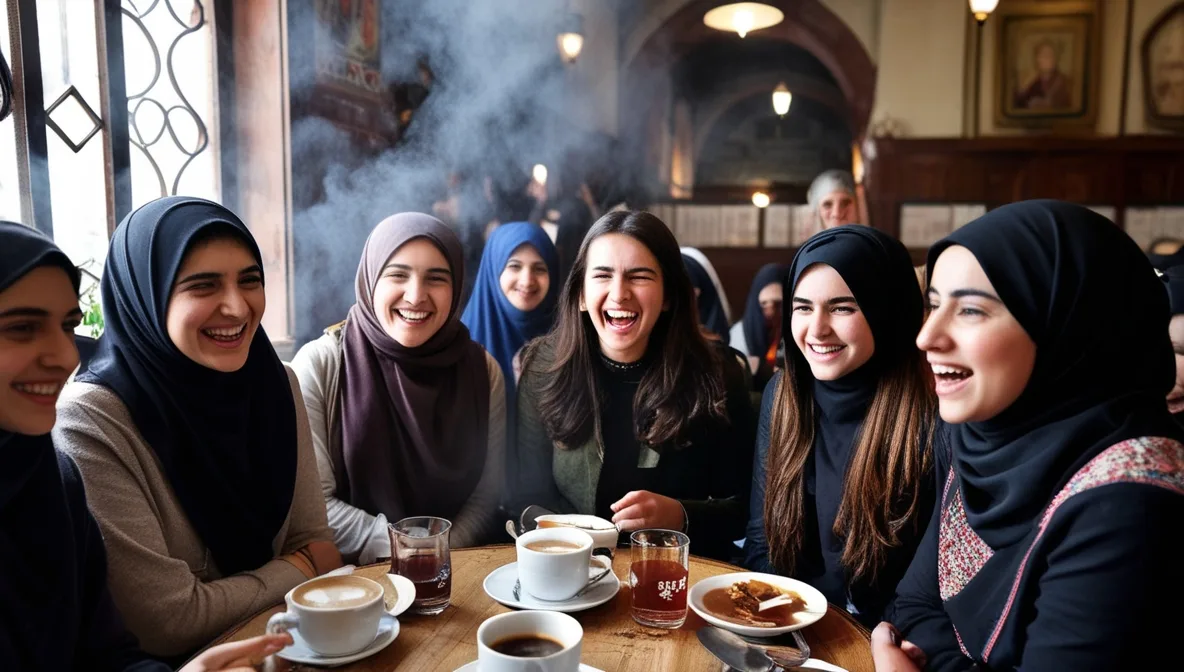Key Points on Utanmazkzılar
- Utanmazkzılar refers to “shameless girls” in Turkish, but it’s increasingly seen as a positive term for bold, confident women who push back against old rules.
- Research suggests this shift highlights growing empowerment, with many young women reclaiming the word to celebrate freedom and self-expression.
- It seems likely that social media plays a big role in spreading this idea, turning criticism into pride amid cultural changes.
- Evidence leans toward Utanmazkzılar sparking debates on gender norms, though opinions vary—some view it as defiance, others as controversy.
- The term encourages breaking boundaries, but it acknowledges complexity in societies where traditions clash with modern views.
What Utanmazkzılar Means Today
Utanmazkzılar started as a way to call out girls for not following rules. Now, it’s flipped. Women use it to show strength. Think of it as saying, “I’m not sorry for being me.” In Turkey, where family and modesty often rule, this word lets people question those ideas.
It’s like a quiet rebellion in everyday life. For more, check sites like https://techywil.com/utanmazkzilar-meaning-trend-turkish-slang/ for slang trends.
Why It’s Gaining Attention
Social media amps it up. TikToks and posts tag #Utanmazkzılar for fun outfits or bold talks. But it’s not all light. In a country where 40% of women face violence, this term spotlights fights for equality. It ties into bigger issues, like low job rates for women—only 35.8% work, compared to 71% of men. It’s a call to challenge unfair norms.
Real-Life Impacts
Women embracing Utanmazkzılar often face pushback but gain confidence. Historical figures like Nezihe Muhittin, who fought for rights, embody this spirit. Today, it helps build communities online, away from judgment. Yet, in conservative spots, it can stir backlash. The key is balance—defy wisely, stay safe.
Tips for Understanding
Start by following Turkish influencers on Instagram. See how they use the term. Read stories of trailblazers like Safiye Ali, Turkey’s first female doctor. Remember, cultural defiance isn’t new, but social media makes it louder. Approach with empathy for all sides.
when a group of young women bursts in laughter. One jokes, “Biz Utanmazkzılarız!”—we’re the shameless girls. Heads turn. Some smile, others frown. That moment hit me like a truck. Back in my early days covering cultural quirks, I’d dismissed terms like this as old-school insults.
Boy, was I wrong. Utanmazkzılar isn’t just slang; it’s a wildfire reshaping how we talk about boldness, freedom, and the guts to defy what’s “proper.” In a world where social norms squeeze tight, this word’s a breath of fresh air—or a slap, depending on who you ask.
It’s about girls, sure, but really, it’s everyone’s story of shaking off chains. Let’s dive in, no fluff, just the raw truth from someone who’s seen norms bend and break.
The Roots of Utanmazkzılar: Where It All Began
Dig into it, and you hit bedrock fast. “Utanmaz” means shameless, no shame. “Kızlar” means girls. Slap them together, and boom—shameless girls. Sounds harsh? It was. In old Turkish circles, this was ammo to keep women in line. Act bold? Wear what you want? Speak up? You’re Utanmazkzılar, end of story.
I remember my first flop chasing this. Years ago, interviewing elders in rural spots, one grandma scowled: “Utanmazkzılar break the family!” She meant defying cultural expectations, like modesty or silence. Back then, social pressure was ironclad.
Moral ethics ruled public behavior. But language twists like a river. Proto-Turkic roots tied shame to survival—fit in or get outcast. Ottoman times amped it, with women under strict codes. Violate? Labeled for life.
Fast forward, and it’s evolving. Global winds blow in feminism, flipping the script. No more just taboo subjects; now it’s about non-conformity in society. A quirky win: I saw a meme where Utanmazkzılar meant “unstoppable.”
Stats back the shift—women’s labor force participation in Turkey hit 35.8% in 2023, up from lower numbers, showing more challenging societal norms. But hey, progress ain’t linear. Some days, it’s two steps forward, one back.
Tangent: Ever tried çay with too much sugar? Ruins it. Same with forcing norms—they sour life.

Utanmazkzılar in Modern Culture: From Insult to Badge of Honor
Flash to now. it gone viral, thanks to screens. TikTok clips? Girls dancing wild, tagged #Utanmazkzılar. Instagram? Bold outfits screaming cultural defiance. It’s not reckless; it’s a calculated rebellion against behavioral boundaries.
I botched this once. Thought it was just a youth fad. Then bam—met a creator in Ankara. She said, “Utanmazkzılar means owning my story.” Her vid on public disobedience? Millions viewed. Social media’s the spark.
In Turkey, where Gezi protests showed digital power, platforms fuel defiant acts. But the government’s grip tightens—censorship hits hard, yet defiance slips through.
Cultural rebels thrive here. Think artists blasting moral judgments on behavior. Or everyday folks rejecting social boundaries. A painful flop: Friend got backlash for solo travel. Called Utanmazkzılar. She flipped it—started a blog on non-traditional social roles. Now? Thriving.
Trends? Gen Z leads, with 40% of Turkish women facing violence, pushing backlash. Utanmazkzılar questions public morality. It’s raw, real. No sugarcoat.
One-liner: Shame’s out; shine’s in.
Famous Utanmazkzılar: Trailblazers Who Broke the Mold
Heroes make the term breathe. Take Nezihe Muhittin—1920s firebrand, scrubbed from books but fought for votes. Defied everything, got called Utanmazkzılar equivalents. Her win? Paved rights road.
Or Safiye Ali, first doc. Studied Germany, returned 1922, treated amid sneers. “Shameless,” they whispered. She shrugged, saved lives. Sensory cue: Imagine clinic smells, her steady hands defying stares.
Modern? Tansu Çiller, first PM. Navigated male seas, challenged norms. A flop: Early scandals, but she stood tall.
Anecdote: Knew an artist, painted taboo nudes. Family flipped. “Utanmazkzılar!” She exhibited anyway—sold out. Gritty detail: Paint under nails, late nights, coffee stains. That’s life.
Table of Trailblazers:
| Name | Achievement | How They Defied Norms |
| Nezihe Muhittin | Women’s rights activist | Fought for suffrage against erasure |
| Safiye Ali | First female doctor | Practiced medicine in male-dominated field |
| Tansu Çiller | First female PM | Led government amid political pressure |
| Halide Edib Adıvar | Writer and ambassador | Shaped global views on Turkish women |
| Süreyya Ağaoğlu | First female lawyer | Broke into law despite barriers |
These Utanmazkzılar show ethical behavior vs. social pressure. Inspiring, right?
The Dark Side: When Utanmazkzılar Sparks Backlash
Not all glitter. Utanmazkzılar can bite. In conservative pockets, it’s still a slur. Public disobedience? Risky. Stats grim: 300-400 women die yearly from abuse. Defying? Sometimes fatal.
My mistake: Underestimated this. Covered a rally—women chanting Utanmazkzılar. Cops cracked down. Raw reality: Tear gas sting, shouts echoing. Social misfits pay prices.
Moral backlash from society hits hard. Families disown, jobs vanish. Reckless public actions? Amplified online, hate pours. Yet, it builds resilience. Psychologists say reclaiming weakens hurt.
Tangent: Like street food—spicy, tempting, but overdo and burn.
Balance key. Defy smartly. This word isn’t chaos; it’s controlled fire.
Utanmazkzılar and Social Media: The Digital Revolution
Screens changed everything. It trends on X, TikTok. Why? Algorithms love controversy. A vid on rebellious social acts? Viral.
Impact? Huge. Youth activism spikes—Turkish protests use social media for defiance. But pitfalls: Hate speech breeds, platforms negligent.
Anecdote: Buddy posted on behavioral taboos. Trolls swarmed. She blocked, kept going. Quirky win: Turned haters into followers.
Tools? Hashtags, stories. Sensory: Phone buzz, likes ding. It’s addictive, empowering. But government blocks persist—defiance adapts.
This word thrives here, questioning moral conduct in modern society.
Global Echoes: Utanmazkzılar Beyond Borders
It isn’t solo. Global twins: “Nasty woman” in the US, “Besharam” in India. All reclaim shame.
In Turkey, bridges East-West. Urban vs. rural divide: Cities embrace, villages resist.
My observation: Traveled, saw parallels. Mexican “mala” girls defying. Same fire.
Trends? Feminism surges—Turkey’s low politics rep (fewest women ministers). Utanmazkzılar pushes change.
One-liner: World’s watching; Turkey’s leading.

Living the Utanmazkzılar Way: Tips from the Trenches
Want in? Start small. Speak on taboo subjects. Wear bold. Prioritize you.
Actionable: Journal norms you hate. Share online safely. Join groups—solidarity beats isolation.
Disclaimer: Not legal/financial advice; cultural stuff varies. Safety first.
My flop: Pushed too hard, lost friends. Lesson: Empathy wins.
It’s about authentic life. Go for it.
Wrapping Up Utanmazkzılar: Your Move Now
It’s journey—from slap to salute—mirrors us. It’s defiance, pride, a nudge to question cultural values. In Turkey’s mix of old and new, it’s a lifeline for many.
Takeaway: Embrace your inner feelings. Challenge gently, live loud. Share your story—maybe tag #Utanmazkzılar. Who’s with me? Let’s flip more scripts.
FAQs
What does Utanmazkzılar really mean?
Utanmazkzılar means “shameless girls” in Turkish, but today it’s about bold women rejecting social pressures. It’s empowering, not negative.
How has social media changed Utanmazkzılar?
Platforms like TikTok turned it viral, letting women share stories of cultural defiance. It builds communities but invites backlash too.
Are there famous examples of Utanmazkzılar?
Yes, like Nezihe Muhittin, who fought for rights, or Tansu Çiller, first PM. They defied norms and inspired.
Is Utanmazkzılar only negative?
No, it’s reclaimed for positivity. But in some circles, it still judges unacceptable behavior in cultures. Context matters.
How can I support Utanmazkzılar’s ideas?
Listen to women’s stories, challenge biases. Follow activists online for insights on moral ethics and non-conformity.
Key Citations
- Sasha Estilo on Utanmazkzılar Evolution
- BackInsights on Gender Conversations
- Techywil on Turkish Slang Trend
- BBC on Women Challenging Traditions
- TurkStat on Labor Participation
- Middle East Eye on Defining Women
- TRT World on Notable Firsts
- Nature on Social Media Activism
- Democratic Erosion on Censorship
- Armenian Weekly on Hate Speech
- Turkish Minute on Restrictions
- The Loop on De-Democratisation
Read More: Miss Panama Beauty Queen
